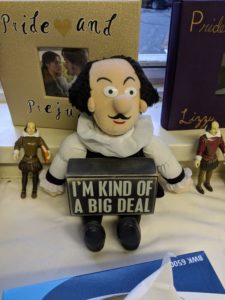A funny thing happened last week that really put the Geek in Shakespeare Geek.
It all started with a Reddit post. A user wrote that he had a copy of the 1997 Folio Society edition of King Lear, where the text is taken from the 1986 Oxford Shakespeare edition of The Complete Works edited by Stanley Wells and Gary Taylor.
Under “The Persons of the Play”, I see “Earl of Gloucester”. I turn the page, and the very first stage direction says “Enter the Earl of Kent, the Duke of Gloucester…”
He is referred to as the Earl of Gloucester only in the list of characters, from what I can tell. Thereafter, he is always referred to as the Duke of Gloucester.
At first, I misunderstood and thought he was saying that Gloucester is always Duke, so it was listing him as Earl on the title page was the mistake. My error was pointed out to me – Gloucester is never Duke, always Earl – so I offered to get some first-hand input on the situation.
And by first-hand, I meant just go ahead and ask Sir Stanley Wells. Because why not? Twitter’s amazing sometimes. We follow each other and have corresponded online on some other occasions.



